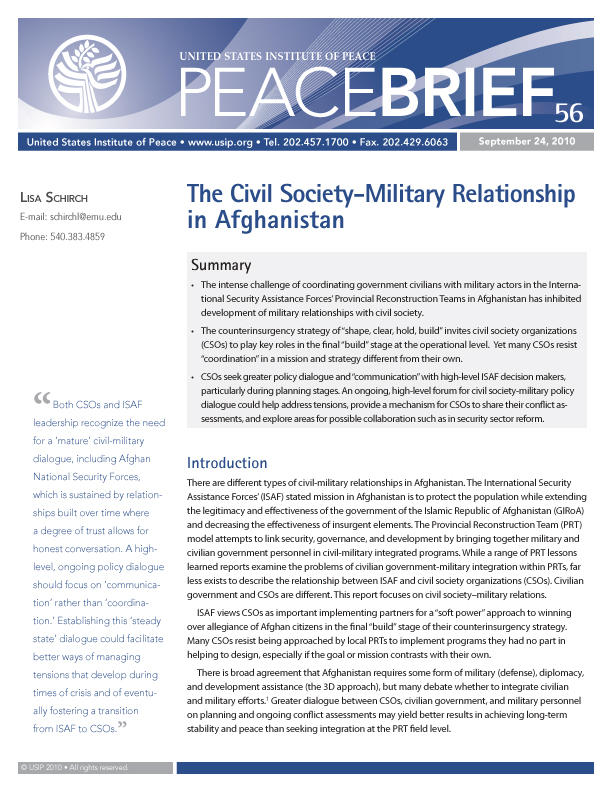The Civil Society-Military Relationship in Afghanistan
This brief is a report on a one-day civil-military roundtable to identify tensions, tradeoffs and opportunities found in the civil society–military
relationship in Afghanistan.

Summary
- The intense challenge of coordinating government civilians with military actors in the International Security Assistance Forces’ Provincial Reconstruction Teams in Afghanistan has inhibited development of military relationships with civil society.
- The counterinsurgency strategy of “shape, clear, hold, build” invites civil society organizations (CSOs) to play key roles in the final “build” stage at the operational level. Yet many CSOs resist “coordination” in a mission and strategy different from their own.
- CSOs seek greater policy dialogue and “communication” with high-level ISAF decision makers, particularly during planning stages. An ongoing, high-level forum for civil society-military policy dialogue could help address tensions, provide a mechanism for CSOs to share their conflict assessments, and explore areas for possible collaboration such as in security sector reform.
About This Brief
This brief is a report on a one-day civil-military roundtable to identify tensions, tradeoffs and opportunities found in the civil society–military relationship in Afghanistan. The event was held at U.S. Institute of Peace on June 4, 2010 and was organized by the 3D Security Initiative of Eastern Mennonite University in partnership with the U.S. Institute of Peace, the Kroc Institute for International Peace Studies at the University of Notre Dame, National Defense University’ Center for Complex Operations, and U.S. Army Peacekeeping and Stability Operations Institute.
Three civil society leaders from Afghanistan presented their work and perspectives: Director of Afghan Civil Society Forum-organization (ACSFO) Eng. Aziz Rafiee, Program Director of Cooperation for Peace and Unity (CPAU) Mirwais Wardak, and Director of Agency Coordinating Body on Afghan Relief (ACBAR) Laurent Saillard. Funding for the event came from the Connect U.S. Fund, the Compton Foundation, and the Ploughshares Fund.
The author, Lisa Schirch, is the founding director of the 3D Security Initiative and a professor of peacebuilding at Eastern Mennonite University’s graduate Center for Justice & Peacebuilding.



